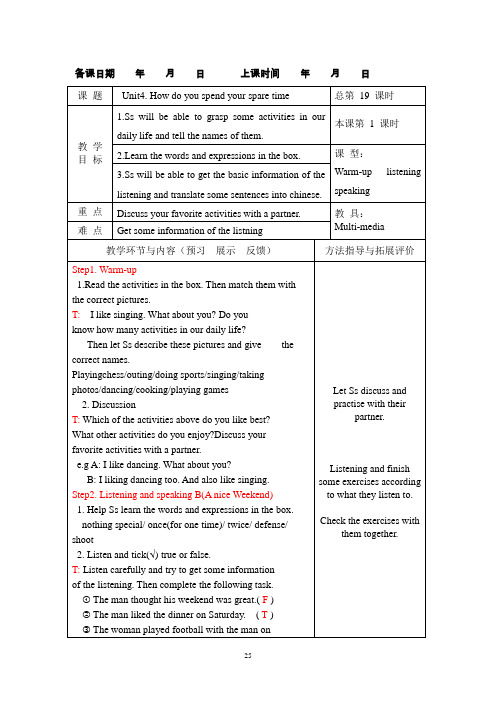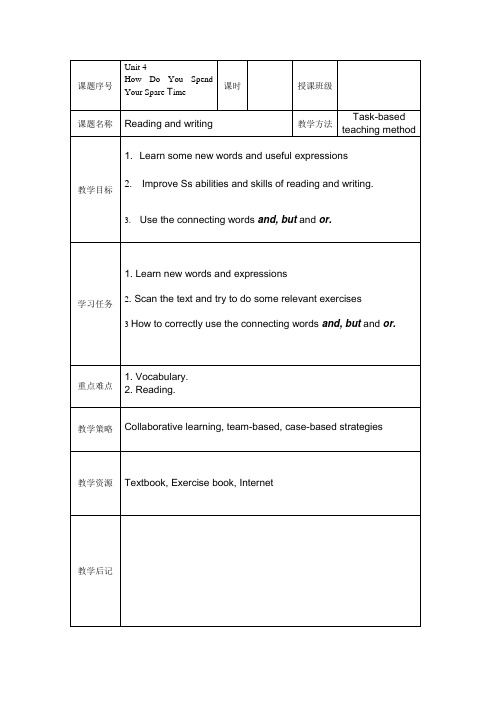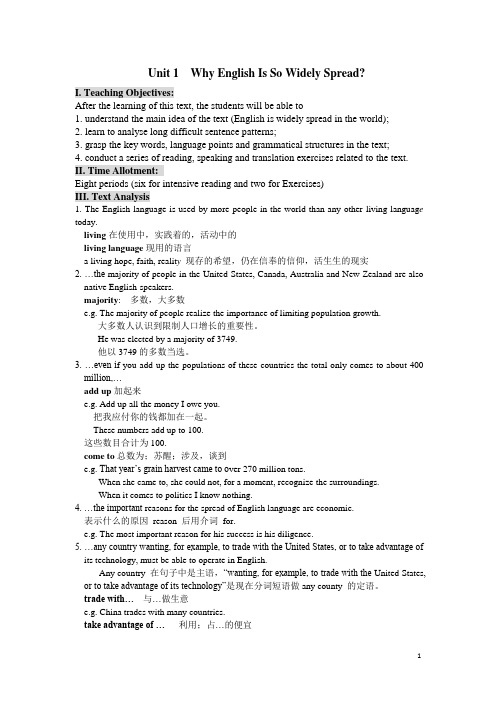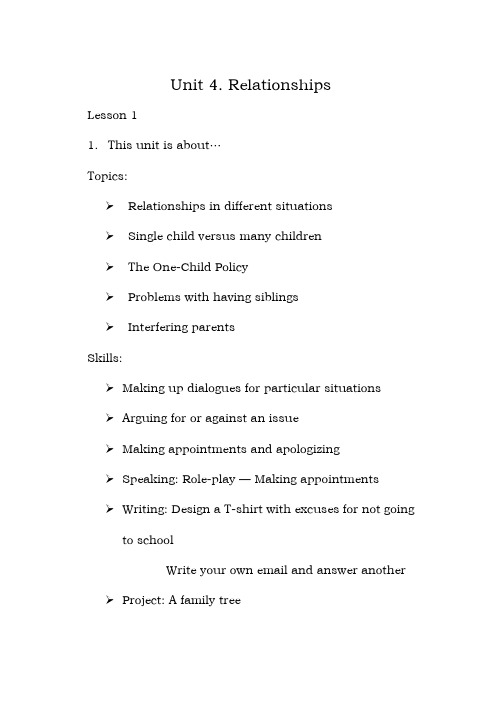高职国际英语教案book1-Unit-4
英语基础模块book1unit4教案

Book1 Unit 4 Welcome to our party!莆田职业技术学校徐宁Unit 4 Welcome to our party!(第一课时教学设计)一、学情分析本教案的授课对象为高一年级电子商务专业学生。
该班共有50名学生,其中女生42名,男生8名。
该班学生学习习惯较好,班级的学习氛围浓厚。
但是由于专业要求和英语的联系不密切,学生对于英语课程并不特别重视,存在以下问题:掌握的词汇量和句型结构少、听力和口语表达能力弱、害羞、课堂参与积极性不强、学习动机不强。
针对以上问题,本教案强调集体配合和合作互助的精神,并通过多种途径激发学生的学习兴趣和参与热情。
形象化的图片教学和有适当紧张度的游戏和表演,不仅能吸引学生的注意力,而且能强化教学效果。
同时教师在课堂上不断提供适时的语言帮助和鼓励,扫除学生在学习过程中碰到的障碍,有助于克服学生的畏缩心理,使他们积极主动地配合教学活动,真正成为课堂活动的主体。
二、教材分析1.教学内容本课时系教材《英语1》(基础模块高教版)第四单元的第一课时,包括Lead-in & Listening and speaking中的Dialogue A两部分,具体内容为:关于天气和参加聚会人物身份的词汇;主人迎接客人、客人恰当回应的对话;在聚会上谈论天气等话题的对话。
这些内容为整个单元的学习活动做语言和知识的准备,也为学生学以致用的语言表达活动提供了语言铺垫。
2.教学重点、难点⑴教学重点学生在较为真实的聚会情景中迎接客人及恰当回应,并交流天气等话题。
⑵教学难点学生了解并运用两项听力策略——Inferring and note-taking;学生找出适合聚会中交流的有趣话题。
三、教学目标1.知识目标⑴学生能掌握部分关于天气和参加聚会人物身份的词汇,如party,weather, season,pleasant,snowy,rainy,windy,sunny,cloudy,foggy,host,guest。
职高英语第一册unit4教案.doc

备课日期年月日上课时间年月日课题Unit4. How do you spend your spare time 总第19 课时教学目标1.Ss will be able to grasp some activities in ourdaily life and tell the names of them.本课第 1 课时2.Learn the words and expressions in the box. 课型:Warm-up listeningspeaking3.Ss will be able to get the basic information of thelistening and translate some sentences into chinese.重点Discuss your favorite activities with a partner. 教具:Multi-media难点Get some information of the listning教学环节与内容(预习展示反馈)方法指导与拓展评价Step1. Warm-up1.Read the activities in the box. Then match them withthe correct pictures.T:I like singing. What about you? Do youknow how many activities in our daily life?Then let Ss describe these pictures and give thecorrect names.Playingchess/outing/doing sports/singing/takingphotos/dancing/cooking/playing games2. DiscussionT: Which of the activities above do you like best? What other activities do you enjoy?Discuss your favorite activities with a partner.e.g A: I like dancing. What about you?B: I liking dancing too. And also like singing. Step2. Listening and speaking B(A nice Weekend)1. Help Ss learn the words and expressions in the box. nothing special/ once(for one time)/ twice/ defense/ shoot2. Listen and tick(√) true or false.T: Listen carefully and try to get some informationof the listening. Then complete the following task.① The man thought his weekend was great.( F )② The man liked the dinner on Saturday. ( T )③ The woman played football with the man onSunday ( F )Let Ss discuss andpractise with theirpartner.Listening and finish some exercises according to what they listen to. Check the exercises with them together.④The woman knew that the man is a good footballplayer. ( F )3. Listen again and complete the sentences.Let Ss listen to the tape of the listening . Then repeat afterthe tape . Last, check their answerswith the whole class.① Year, it was OK. _____________really.② I went to a friend's _____on Saturday.③ I didn't know you played football. _______________do you play?④ So are you _______________?Step3. Learn by doing1. Ask each other about your abilities in sports,etc. , using Are you any good?Then explain yourAnswers.2. Ask two classmates about their spare-timeActivities:what do they for fun and how often do they dothem?Then complete the chart and share your answers withthe class.Step4. Homework1.Review some words again.2.Prepare for new lesson.教学反思备课日期年月日上课时间年月日课题Unit4. How do you spend your spare time 总第20 课时教学目标1.Ss will be able to grasp some key sentences of thelistening and use them to communicate with eachother.本课第 2 课时2.Ss will be able to read the dialoge fluently课型:ListeningSpeaking Reading 3.Ss can grasp the main idea of the passageby reading fast.重点Reading comprehension 教具:难点Use the expressions to talk about hobbies Multi-media 教学环节与内容(预习展示反馈)方法指导与拓展评价Step1.What is your hobby?1. ListeningT: What does Billy like to do in his spare time?Make your guess. Then listen to the dialogue to checkyour prediction.Play the tape of the conversation for Ss to listen. Thenlook at the following pictures and tick(√)2. Repeat and underlineT: listen again. Then underline the questions about hobbies in the conversation and try to repeat after it.3.practice① Use the expressions you've learned to talk about hobbies with your partner. Then completethe chart with the information you get.Your partner's hobbies How long has he/shebeen interested in it?②Work in pairs and complete the conversationon P58.Step2. Reading comprehension1.Fast reading.①Look at the picture in the passage. Guess what Mary's hobby is.Then scan the passage to checkyour prediction.②Reading again and answer: how does Mary plant her flowers? Put the following pictures inOrder.(on P62)2.Reading carefully.Read the passage again and circle the correct answer.①Every year, Mary plants her flowers in _. ( b)Help them understand thelistening . Talking with their partner use the expressions with the help the teacher.Reading the passage with the teacher's help.Do these exercises according to the passage,then checkwith the whole class.a. winterb. springc.summer②What does Mary like most? ( b)a. Roses.b. Lilies.c. Cucumbers.③What does Mary do with her flowers? (c)a.She makes salads with them.b.She gives them to friends in the dancing class.c.She wears them in her hair.Step3.homework 1.read the passage again.2.Try to find out some key points教学反思备课日期年月日上课时间年月日课题Unit4. How do you spend your spare time 总第21 课时教学目标1. Ss will be able to understand the passage andread fluently.本课第 3 课时2.Most of the students can complete some exercisesaccording to this passage. 课型:Reading& writing 3. Ss will be able to master some language points inthe passage.重点Read fluently and complete exercises 教具:Multi-functionalteaching equipment(CAI)难点Some language points in the text教学环节与内容(预习展示反馈)方法指导与拓展评价Step1. Warm-upChecking some new words in the passagee.g garden/pot/even/inside/beginning/hang/outside/rose/crazy/worth/penny/in full bloom/sightStep2. Reading and analysing the passage1. Read the following paragraph. Circle the connecting words "and", "but" and "or" , and underline the ideasFirst , let then try doing , then check it with the wholeclass.They need more exercises toimprove.that each connecting word links.(Mary loves planting flowers and vegetables. Her house is small but her garden is really big.Every year , Mary starts plants in April or earlyMay. She spends a lot of money on her garden ,but she thinks it is worth every penny.)2. Language points① Every year in early spring, she begins by planting flowers in small pots (that she keeps near a window. ) The attributive clause(让学生找出本文所有的定语从句)② once "一旦"e.g Once you understand this rule, you will have no further difficulty.Once you have decide to do something, you should do it well.③ move into : to come or go intoe.g I moved into a new house last week.3. Complete the following paragraph. Use the connecting words to combine the details.(on P63)Step 3. Homework1. read the passage again2. Do some exercises on exercise book .教学反思备课日期年月日上课时间年月日课题Unit4. (Further reading ) 总第22 课时教学目标1.Ss will be able to read the passage by themselvesand understand it.本课第 4 课时2.They can complete some exercises. 课型:Further reading重点Reading skills 教具:Exercise book 难点Writing skills教学环节与内容(预习展示反馈)方法指导与拓展评价Step1Further readingHave Ss read the article on P71 twice, and have adiscussion.①What’s the differences among the school clubs in the US?②What clubs does your school have?③Are you a member of any of them?Step2 exercise book on p311.Read the passage and write Women or Men in the blanks.①____Clothes shops, clothes shops, more clothes shops.②_____Clothes shops, electronics shops, music shops. How long do they spend shopping?Discuss in pairs.Let Ss do it by themselves.Check by themselves. then the teacher check their answers again.①____ An hour, possibly two.②_____A day.What do they love?①____They love looking at everything, trying onclothes,and talking to the shop assistants......②____They love getting home! They love trying ontheir new clothes and plying with their new "toys".What do their hate?①_____They hate waiting for woman to decide whatthey want. They hate asking shop assistants for help.②_____They hate hearing"Can we go home now? Thefootball starts in half an hour."2.Read the passage and fill in the chart. (on P32)3.Read the report result of the top ten free-timeactivities in a city. Use and, but,and or to explain theresult.The Top Ten Free-time Activities in the city____________________________________________________________________________教学反思备课日期年月日上课时间年月日课题Unit4.How do you spend your spare time 总第23 课时(Real Life Skill)教学目标Ss will be able to make a weekly plan for the clubactivities.本课第 5 课时Ss will be able to join the group work friendly. 课型:Real Life Skill重点Real life skills 教具:难点Group work教学环节与内容(预习展示反馈)方法指导与拓展评价Step1. Real life skills1. Practise on P68 .(let students look at pictures anddiscuss.)Your friends invite you to join one of the followingschool clubs. Think carefully and decide which clubyou want to join.Cards club/ music club/ art club/ computer club/ bookclub/ sports club2.Now work with the classmates who have chosen thesame club as you do, and make a weekly plan for the club activities.Dancing clubTime Activities Places Monday Practice Classroom314 Wednesday Practice Classroom314 Saturday Ball Dining hall Sunday Disco party Sports field3.Report your plan to the class.ExampleThere are_____people in our club. We plan to do the following every week: on Monday, weshall________________________________________ ____________________________________________ _______;on_______________Step2. HomeworkPractise making a weekly plan for the club activities. let students look at pictures and discuss.Writing by themselves教学反思备课日期年月日上课时间年月日课题Unit4.How do you spend your spare time( Language in use)总第24 课时教学目标1.Ss will be able to read phonetics 本课第6 课时2.They can master the use of the adverb 课型:Language in use 3.V ocabulary重点The use of the adverb 教具:Multi-functionalteaching equipment(CAI)难点Deal with some exercises教学环节与内容(预习展示反馈)方法指导与拓展评价Language in useStep1. phonetics1. Listen and read the following vowels and words./ei/ /ai/ /ɔi/game cake drive light toilet toy2. Listen to the words in the box. Then group themaccording to their pronunciation.train/ toy/ kite/ plane/ light/ lion/ coin/ rice/ cake/ boy/ table/ tiger/Step2. GrammarAdverbs of Frequency and Time Expressions(on P65)Exercises: Listen to the vowels and words ,then repeat after it.1. Complete the conversations with adverbs offrequency.① A: Do you feel tired?B: Yes, I___feel tired! There is so muchhomework to do!② A: Do you drink coffee?B: I___drink coffee, but I usually drink tea.③ A: Do you like steak?B: Actually,I__eat steaks. I can't stand theSmell.2.Ask and answer questions about Lisa's weeklyschedule below. (on P66)Step3. V ocabulary1. let Ss write down the right color for eachballoon below.2. Complete the sentences with the correctwords from the box. Change the form ifNecessary.(on P67)Step4. HomeworkDo exercises book on P31教学反思备课日期年月日上课时间年月日课题Unit4 Revision 总第25 课时教学目标Revise some words and phrases 本课第7 课时Reading &Grammar&Writing 课型:Revision Do some exercises重点Do some exercises 教具:Exercise book 难点Do some exercises教学环节与内容(预习展示反馈)方法指导与拓展评价Step1. Words & phrases1.In this unit you have learned these words.spare/since/nothing/once/twice/quite/terrible/shoot/garden/pot/even/inside/beginning/hang/outside/rose/crazy/worth/penny/full/sight/purple/fall/own/if/nothing special/worth every penny/infull bloomStep2.Reading and talkingLet Ss talk about spare-time activities and do someexercises on P32-33(exercise book)Step3.GrammarRevise the grammar and do some exercises教学反思35。
中职高教版英语1基础模块(1--4单元教案)

【学生学习情况检测】
1.Activity 19. Write and talk. Talk about your parents and the persons that you know with your partner and take notes of what your partner tells you. Eg. My father’s name is Li Ming. He is a doctor.
5.Listen more and improve the listening ability step by step, keep the sound symbol in mind.
pare English with Chinese and find the differences in language points.
课后分析:
NO:5-6
课程名称
英语
授课时数
2
周 次
第周
教学内容
Unit 2 I can do it.
Lead-in, Listening and Speaking, Reading and Writing
教学方式
Theory
Practicing
【主要教学内容】
Content:
1、Have a revision ofkeywords and expressionsof Unit 1.
3.Ask questions and help the students to understand the main idea of each lesson.
中职英语教案(苏教版)Book1-U4-3

1. Take a dictation test of new words.
2. Review phrases and sentences.
1. Have a prediction of the detailed of this passage.
2.Scan the passage and answer the questions.
3 Listen to the tape and underline new words.
4.Underline some related sentences and do some translations.
5.Learn the languagepoints
e the connecting wordsand,butandor.
学习任务
1.Learn new words and expressions
2. Scan the text andtry todosomerelevant exercises
3How to correctly usethe connecting wordsand,butand源自r.Revi-sion
Step II. Read-
Ing &
Writ-
ing
1.1. Give a dictation test of new words.
2. Review some important phrases and sentences.
1Ask Ss to look at the title andpicture thenhave a guess what the passage will be talk about.
中职英语教案 unit 1 4

Book1 Unit 1 Nice to meet you!(第四课时教学设计)一、教材分析1.教学内容本课时系教材《英语1》(基础模块高教版)第一单元的第四课时,包括unit task和pronunciation practice两部分,具体内容为:单元任务和发音练习。
2.教学重点、难点⑴教学重点词汇、语法、单元任务总复习⑵教学难点发音练习二、教学目标1.知识目标⑴掌握个人信息、制作个人名片相关的词汇、句型⑵正确朗读8个音标(3)互换名片并自我介绍2.能力目标⑴学生能流利使用关于个人信息和名片设计的词汇、句型。
⑵学生正确朗读所教的8个音标。
(3)学生能正确使用名片。
3.情感目标学生能利用自制名片与同学进行名片互换,并了解职场礼仪。
三、教学步骤Step One Lead-in (5m)1. Make a comment on the students’homework. Read some good sentences made by the students. Type some of the sentences on ppt and ask the whole class to fill in the blanks with be.(设计意图:作业点评是学生最喜欢的环节之一,值得教师长期坚持。
让学生出练习题,是半开放性的作业,可以激发学生的求异思维,带给教师许多惊喜,更好地推进教学。
)2.Review the ways of greeting a person and the job words.(设计意图:复习单元重点,为下面的名片交换环节打基础。
)Step Two Video& Exchange name cards (25m)1.Do you know how to offer your name card? Do you know how to accept a name card? Collect the students’ answers on the blackboard.(设计意图:摸底调查,了解学生对名片礼仪的现有知识。
高职高专英语第一册(校编)教案【全】

Unit 1 Why English Is So Widely Spread?I. Teaching Objectives:After the learning of this text, the students will be able to1. understand the main idea of the text (English is widely spread in the world);2. learn to analyse long difficult sentence patterns;3. grasp the key words, language points and grammatical structures in the text;4. conduct a series of reading, speaking and translation exercises related to the text. II. Time Allotment:Eight periods (six for intensive reading and two for Exercises)III. Text Analysis1. The English language is used by more people in the world than any other living languag e today.living在使用中,实践着的,活动中的living language现用的语言a living hope, faith, realit y现存的希望,仍在信奉的信仰,活生生的现实2. …the majority of people in the United States, Canada, Australia and New Zealand are also native English-speakers.majority: 多数,大多数e.g. The majority of people realize the importance of limiting population growth.大多数人认识到限制人口增长的重要性。
高职国际英语教学案book1Unit

Unit 4. RelationshipsLesson 11. This unit is about…Topics:➢Relationships in different situations➢Single child versus many children➢The One-Child Policy➢Problems with having siblings➢Interfering parentsSkills:➢Making up dialogues for particular situations➢Arguing for or against an issue➢Making appointments and apologizing➢Speaking: Role-play — Making appointments➢Writing: Design a T-shirt with excuses for not going to schoolWrite your own email and answer another ➢Project: A family treeTop excuses for not going to the dentist’s Grammar:➢Adverbs:Comparison of adverbs2. Focus2.1 Match dialogues a–f to the situations 1–6.First, take a look at all the 6 situations.a. A: Why do we always have to watch what my brotherand sister want to?B: Because you chose yesterday and now it is somebody else’s turn.b.A: Is this your first time here?B: No, I am a regular customer. I come every six weeks.But I had to postpone my last appointment because my sister was ill.c. A: Where were you yesterday, Brian?B: I’m sorry that I couldn’t come to school but I was ill and had to stay in bed.d. A: Why did you cancel that dentist’s appointment? B: Because I hate dentists. And I thought my toothache would go away.e. A: Why do you always make dentist’s appointments for me?B: Because you never have time; when you make an appointment you forget to go.f. A: What is the problem with being an only child?B: You never have anybody to talk to or share your problems with.2.3 Now create dialogues for these three situations:1. Your friend has just cancelled a visit to the cinemawith you (for the second time!).Example:A: Why have you cancelled our visit to the cinema again? B: I’m sorry. I forgot that I had to go to m y grandmother’s tonight.A: But that is what you always say when you do not want to dosomething with me.B: That’s not true. I only say that when I want to cancel a visit to thecinema.2. Your grandfather has just told you he will give you the money for driving lessons. However, he says that you will have to drive him to the doctor’s once a week. Example:A: Okay, I will give you the money for driving lessons butyou willhave to drive me to the doctor’s once a week.B: That’s okay. But I can’t go on Mondays, Wednesdays, Thursdaysand Fridays.A: And what is the problem on those days?B: In the mornings I have school and in the afternoons I have apart-time job in a supermarket.3. You are complaining in a shop that your MP3 player that you bought last week does not record. Unfortunately you have lost the receipt.Example:A: I bought this MP3 player last week and it doesn’t record.B: Can you show me your receipt, please?A: I seem to have lost my receipt.B: I’m very sorry b ut we cannot help you unless youshow us thereceipt.3. Text Study (Passage A)3.1 Background InformationOne-Child PolicyOfficially the Family Planning Policy, it is the population control policy of the People’s Republic of China.Key words:•population growth rate•ethnic minorities•rural families•exception•siblings•an only childexempt fromNow, since the One-Child Policy was introduced, people have been able to and required to save money moreeasily.:After the One-Child Policy was issued and implemented, gradually people found that they could save up some money much more easily than before. At the same time, people also found that they had to save more money for their unknown future because of the One-Child Policy.3.2Words and Expressionscampaign n. 运动One-Child Policy 独生子女政策delegate n. 代表do away with remove 废除sibling n. 兄弟(或姊妹)give birth to have a baby 生孩子octuplets n. 八胞胎3.3TextDifferent countries, different families — but which is better?3.3.1Explanation of important words in details1.campaign n. a systematic course of aggressive activities for some specific purpose (社会、政治)运动,活动e.g. T he candidate kicked off his campaign with a speech on t elevision.该候选人由电视演讲开始了他的竞选活动。
新世纪高职高专第一册教案1-Unit (4)

Unit 4 Man and WomanTEACHING OBJECTIVES:1. Master the key words and structures;2. Be able to explain the differences between men and women with respect to the social position and the career ladder as well;3. Develop the students’ listening and speaking skills including the knowledge of phonetics (Rising Dipthongs);4. Master the grammar rules related to active and passive voices;5. Learn how to write greeting cards.TEACHING TIME: 4 periods/weekIMPORTANT POINTS:1. V ocabulary2. Some useful expressions3. Study dialogues and practice4. Rising dipthongs5.Active and passive voicesDIFFICULT POINTS:1. Text understanding2. Word Usage3. Active and passive voicesTEACHING AIDS: Blackboard, chalks, tape-recorder, CDTEACHING APPROACHES: Task Based Language Teaching, Communicative Teaching MethodTEACHING PROCEDURE:I.QuestionsIf you had a choice, would you choose to be a man or woman? Why or why not? II. Lead In1. Background information1) Bachelor’s Degrees Earned by American WomenWomen have earn ed more than half of all bachelor’s degrees every year since 1981–1982. They still trail men in certain fields but have made substantial gains since 1970 –1971.Women earn a greater proportion of bachelor’s degrees than they did 30 years ago. In 1970–1971, women earned 43 percent of all bachelor’s degrees. In 2001–2002, women were awarded 57 percent of all bachelor’s degrees. Some fields that were female-dominated in 1970–1971 remained so in 2001–2002, including health professions and related sciences, education, English language and literature/letters, and visual and performing arts. Though women earned less than half of the bachelor’s degrees in the traditionally male-dominated fields, and in 2001–2002, they have made substantial gains since 1970 –1971.II. Reading of the text1. Global readingQuestions and AnswersDirections: Skim the paragraphs for answers to the following questions.Paragraph 1:Question: What makes it difficult to understand what boys and girls show while choosing subjects?Answer: Besides genetic differences, there are many other important factors that may influence their choices.Paragraph 2:Question:What do the statistics and the report show?Answer: Although girls are equal to boys in mathematics, they have not been encouraged to do so.Paragraph 3:Question:What’s t he difference in nursery school?Answer: Only boys, not girls, are encouraged to work on their own and complete tasks.Paragraph 4:Question: What does the further report reveal?Answer: The teachers seem to give more attention to boys than girls.Paragraph 5:Question: Why do girls avoid mathematics courses?Answer: Girls avoid mathematics courses mainly for social reasons rather than being afraid of the difficulty.Paragraph 6:Question:Why don’t the teenage gir ls like to take mathematics and science up? Answer: Because girls regard mathematics and science as “masculine” subjects, they are less likely to take them up.2. Detailed readingLanguage points and the paraphrases of difficult sentences:1.anyway: ad.1) in any way or manner 不论用何种方式e.g. Get the job done anyway you can.2) in any case; at least无论如何;至少e.g.I don’t know if it was lost or stolen; anyway, it’s gone.3) nevertheless; regardless但是;不顾e.g.It was raining but they continued the Marathon anyway.e up with: find or offer (an answer, a solution, etc.)提出e.g.He couldn’t come up with an answer.3.convincing: adj. capable of causing someone to believe that something is true orreal有说服力的;令人信服的e.g. There is no convincing evidence that advertising influences total alcohol consumption.Related word:persuasiveExtended words:convince, convinced, conviction4.point out: indicate指出e.g. I will point out that his help isn’t welcome.5.influence: v. have an effect on影响e.g.The weather influences crops.n. the effect that a person has on sb.’s decisions, opinions, or behavior or the way sth. happens影响e.g.My teacher’s influence made me study science at college.Related word:affectExtended words:influential6.suggest: v.1) offer for consideration or action建议,提出,暗示e.g.The teacher suggests things for children to do.2) bring to mind by logic or association 使人想起,使人联想到e.g.The thought of summer suggests swimming.3) state sth. in an indirect way暗示e.g.That girl’s sun-tanned face suggests excellent health.Related word: advise, imply, proposeExtended words:suggestion, suggestible, suggestive7.It is … for sb. to do sth.:某人干某事……e.g.It is very good for someone to table a proposal (提出建议).8.While it is socially unacceptable for people not to be able to read and write, it isstill acceptable for women to say that they are “hopeless” at maths.Paraphrase:Although in a modern society it is unthinkable that people are unable to read or write, it seems to be acceptable for women to claim that they are very bad at maths.9.encourage: v. inspire with hope鼓励e.g.I encouraged them to work hard and to try for the examinations.Related word:inspireExtended words:encouragement, encouraging, encouraged, discourage10.The explanation for the difference, which is apparent during the teenage years, goes as far back as early childhood experiences.Paraphrase:The explanation for the difference, which is apparent during the teenage years, could be found in some of the early experiences of childhood.11.apparent: a. clearly seen or understood明显的e.g.It was apparen t to all of us that there wasn’t enough water.Extended word: apparently12.go back (to): have one’s origins in (an earlier time) 追溯至e.g.This festival goes back to the 1980s.13.on one’s own: by one’s own efforts独自地e.g.She got the job on her own.14.Interes tingly, both boys and girls tend to regard such “masculine” subjects like mathematics and science as difficult.Paraphrase:It is interesting that both boys and girls often look upon these boys’ subjects like mathematics and science as difficult.15.Most teachers who took part in the study claimed that they expect their male students to do better at mathematics and science subjects than their female students.Most teachers taking part in the study of the difference between boys and girls said that they expect their boy students to do better at mathematics and science subjects than their girl students.16.avoid: v.1) keep away from避免e.g.I crossed the street to avoid meeting him.2) keep … from happening 防止……发生e.g.We can avoid illness with rest and a balanced diet.Related word: shun, evadeExtended words: avoidable, avoidance17.take up: begin to do or learn开始从事e.g.He took up art while at school.3. Text analysisParagraphs Main Ideas1 The scientists have tried to explain the differences between men andwomen at science and maths.2 Girls are equal to boys in mathematics. Girls only stop studyingmathematics because of social attitudes.3 The differences during teenage years result from educationalattitudes in childhood.4 The teachers seem to give more attention to boys than to girls.5 Both boys and girls tend to regard subjects like mathematics andscience as difficult.6 Mathematics and science are mainly masculine subjects, so theteenage girls are less likely to take them up.To summarize the textIII. Exercises1.Let students do the exercises on pages 55-57.2.Check the exercises.3.Teacher explains important points in detail.IV. Listening and speaking1. Listening1.Give students a few minutes to read through the printed materials for eachlistening item.2.Listen to the material for the first time without looking at the book.3.Listen to the material for a second time, and ask students to try to do theexercises.4.If the class finds it a difficult job fulfilling the tasks, teacher can play therecordings third or more so that most of them can understand.5.Listen to the material for one more time with a pause after each sentence, andask students to repeat the sentence during the pause.6.Do exercises in the section.2. SpeakingUseful Expressions:What do women like most?Women really enjoy shopping.Are boys interested in football?Boys are usually crazy about it.Do men and women share the same interests?Men and women are usually keen on different things.V Grammar and Phonetics1. Grammar: Active V oice and Passive V oice1. Introduce the rules related to active voice and passive voice in grammar tips.2. Ask students to do the exercises.3. Check the answers.2. Phonetics: Rising Diphthongs ([ei] [ai] [ i] [əu] [au] )1. Invite some students to read the rising diphthongs, words and sentences.2. Play the recording.3.Tell the students the different positions of the speech organs for these sounds.4. If the class finds it an easy job fulfilling the task, play the recording once and check the students’ answers.5. If not, better play the recordings two or three times and let the students listen and repeat after the recordings.6. Ask the students to read and translate the sentences in Task III and then present the references.VI. Practical Writing1. Teach the Format of Greeting Cards卡片的写作与非正式的信件类似,首先要注明收信人的姓名,最后要有署名。
- 1、下载文档前请自行甄别文档内容的完整性,平台不提供额外的编辑、内容补充、找答案等附加服务。
- 2、"仅部分预览"的文档,不可在线预览部分如存在完整性等问题,可反馈申请退款(可完整预览的文档不适用该条件!)。
- 3、如文档侵犯您的权益,请联系客服反馈,我们会尽快为您处理(人工客服工作时间:9:00-18:30)。
Unit 4. RelationshipsLesson 11. This unit is about…Topics:➢Relationships in different situations➢Single child versus many children➢The One-Child Policy➢Problems with having siblings➢Interfering parentsSkills:➢Making up dialogues for particular situations➢Arguing for or against an issue➢Making appointments and apologizing➢Speaking: Role-play — Making appointments➢Writing: Design a T-shirt with excuses for not going to school Write your own email and answer another ➢Project: A family treeTop excuses for not going to the dentist’s Grammar:➢Adverbs:Comparison of adverbs2. Focus2.1 Match dialogues a–f to the situations 1–6.First, take a look at all the 6 situations.a. A: Why do we always have to watch what my brother and sisterwant to?B: Because you chose yesterday and now it is somebody else’s turn.b.A: Is this your first time here?B: No, I am a regular customer. I come every six weeks. But I had to postpone my last appointment because my sister was ill.c. A: Where were you yesterday, Brian?B: I’m sorry that I couldn’t come to school but I was ill and had to stay in bed.d. A: Why did you cancel that dentist’s appointment?B: Because I hate dentists. And I thought my toothache would go away.e. A: Why do you always make dentist’s appointments for me?B: Because you never have time; when you make an appointment you forget to go.f. A: What is the problem with being an only child?B: You never have anybody to talk to or share your problems with.2.3 Now create dialogues for these three situations:1. Your friend has just cancelled a visit to the cinema with you (forthe second time!).Example:A: Why have you cancelled our visit to the cinema again?B: I’m sorry. I forgot that I had to go to my grandmother’s tonight. A: But that is what you always say when you do not want to do something with me.B: That’s not true. I only say that when I want to cancel a visit to the cinema.2. Your grandfather has just told you he will give you the money for driving lessons. However, he says that you will have to drive him to the doctor’s once a week.Example:A: Okay, I will give you the money for driving lessons but you will have to drive me to the doctor’s once a week.B: That’s okay. But I can’t go on Mondays, Wednesdays, Thursdays and Fridays.A: And what is the problem on those days?B: In the mornings I have school and in the afternoons I have a part-time job in a supermarket.3. You are complaining in a shop that your MP3 player that you bought last week does not record. Unfortunately you have lost the receipt.Example:A: I bought this MP3 player last week and it doesn’t record.B: Can you show me your receipt, please?A: I seem to have lost my receipt.B: I’m very sorry b ut we cannot help you unless you show us the receipt.3. Text Study (Passage A)3.1 Background InformationOne-Child PolicyOfficially the Family Planning Policy, it is the population control policy of the People’s Republic of China.Key words:•population growth rate•ethnic minorities•rural families•exception•siblings•an only childexempt fromNow, since the One-Child Policy was introduced, people have been able to and required to save money more easily.:After the One-Child Policy was issued and implemented, gradually people found that they could save up some money much more easily than before. At the same time, people also found that they had to save more money for their unknown future because of the One-Child Policy.3.2Words and Expressionscampaign n. 运动One-Child Policy 独生子女政策delegate n. 代表do away with remove 废除sibling n. 兄弟(或姊妹)give birth to have a baby 生孩子octuplets n. 八胞胎3.3TextDifferent countries, different families — but which is better?3.3.1Explanation of important words in details1.campaign n. a systematic course of aggressive activities for some specific purpose (社会、政治)运动,活动e.g. The candidate kicked off his campaign with a speech ontelevision.该候选人由电视演讲开始了他的竞选活动。
Despite fierce opposition, the government is pressing on with its campaign to eliminate corruption.尽管遭到了强烈的反对,政府还是在推动根除腐败的运动。
2.delegate n. somebody speaking for the people 代表e.g. The delegate moved for a reconsideration of the suggestion.这位代表提议重新考虑这一建议。
They drafted her to serve as their delegate. 他们选她当代表。
3.delegate v. 授(权);把(职责、责任等)委托(给)e.g. The Chinese people delegate their power to the People’sCongress. 中国人民授权于人民代表大会。
4.delegation n. 代表(团);委派;授权e.g. The statement of our delegation was singularly appropriate to the occasion. 我们代表团的声明非常适合时宜。
